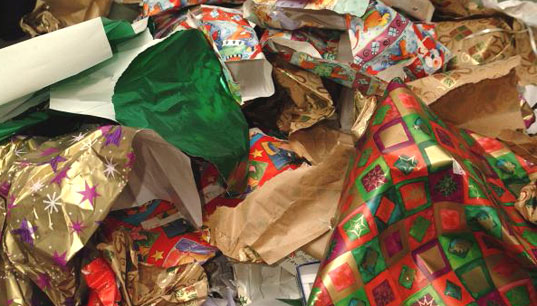
(Flickr Commons)
The ‘season of giving’ has become the capitalist’s favourite time of year. Many people feel an obligation to spend money buying thoughtful gifts for their loved ones. Though Muslims don’t tend to celebrate Christmas in particular, especially those in the West come to understand the culture around gift-giving at the end of the year.
Many people feel ashamed not to exchange gifts, as though it will stigmatize them. Trying to find the perfect gift can take a lot of mental energy and produce a fair amount of stress; some just resort to an ‘at least I got you something’ item, which will likely be discarded soon after it is received. Due to this feeling of obligation to give material items, corporations and big-box stores make exorbitant profits each year.
The waste produced during this time is astronomical, and it comes in many forms – food, plastic, batteries, wrapping paper, etc. According to the US Environmental Protection Agency, “Between Thanksgiving and New Year’s Day, American household waste increases by more than 25 per cent. Trash cans full of holiday food waste, shopping bags, bows and ribbons, packaging, and wrapping paper contribute an additional 1 million tons a week to our landfills.”
The waste associated with gift-giving is just one of the ecological consequences of holiday celebrations. There’s also the factor of actual pollutants. In India, Diwali is one of the largest festivals of the year. People explode firecrackers and fireworks for days on end. This results in thick fog in the air that contributes to India’s extremely poor air quality and millions of premature deaths.
I recently travelled to India during Diwali and saw for myself how much waste and smog was created during the celebration. I was in Thanjavur for the actual day of Diwali; the air was never clear and there was trash piled all along the roadways.
Recently, the Indian people took to the streets, demanding that the Government tackle the air pollution problem, but it is difficult to break celebratory habits for the sake of long-term health, especially if many people do not make a connection between their actions and the health of their environment.
It is difficult to break traditions. The excitement around opening a beautifully wrapped present thoughtfully procured just for you can evoke strong memories of a happy childhood. Still, there are a variety of ways to be more conscious of environmental impact during any holiday.
First, consider one thoughtful gift rather than many, individually wrapped unwanted ones. Purchase locally to reduce on fuel for the item being shipped. Try to buy from stores that sell ethically sourced items in less packaging. Use biodegradable wrapping paper or wrap gifts in fabric.
Gift an experience rather than an item. For electronic gifts, attach rechargeable batteries instead of single-use ones.
If you get a tree, try a real one, as they are somewhat better for the environment than artificial ones, which cannot be recycled. Use previous year’s holiday cards as this year’s gift tags. Take leftover food to a local food bank. Food waste around the holidays’ skyrockets. A University of Manchester study found that Christmas food waste has the same carbon footprint as a car driving around the globe 6,000 times.
It’s not just the end-of-the-year holiday season when we should be conscious of our celebratory habits. Throughout the year, holidays give us a reason to splurge; to buy more and to do things we’d normally think twice about. If people kept thinking twice and sought to express their love by simpler, meaningful gestures rather than by purchasing material items, the environment would be spared, and the true depth of personal relationships would become clearer.
Holiday season marketing is difficult to avoid and to not be taken in by. The mindset around ‘stuff as love’ is hard to break. There are psychological and sociological studies conducted for the sole purpose of selling people things.
It’s also easy to blame the industry for the state of our environment, but a collective effort at making the holidays a bit less wasteful, and a bit more meaningful, can do good all around – for the environment, for our mental health, and our bank accounts.
Sarah Sakeena Marshall,
English Language Teacher & Environmental Columnist